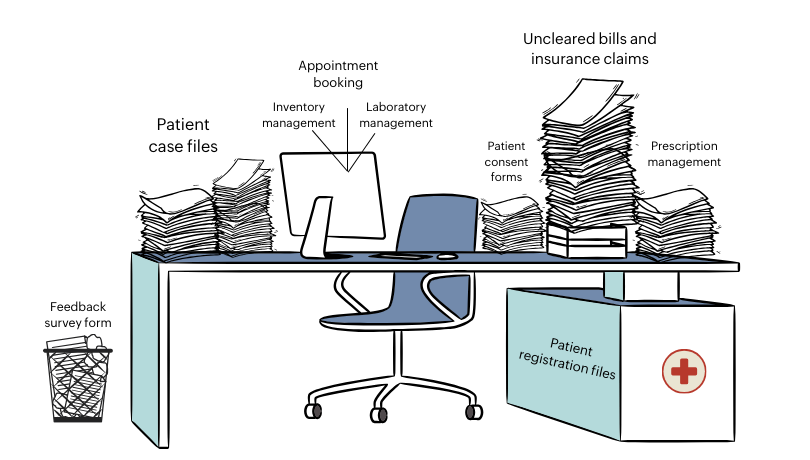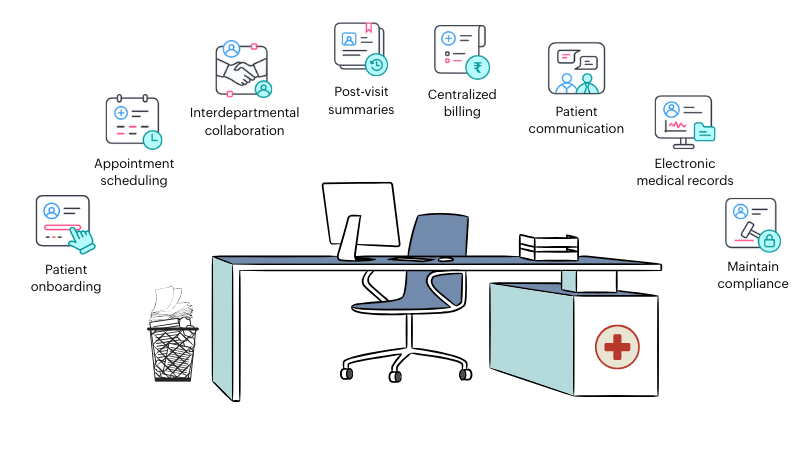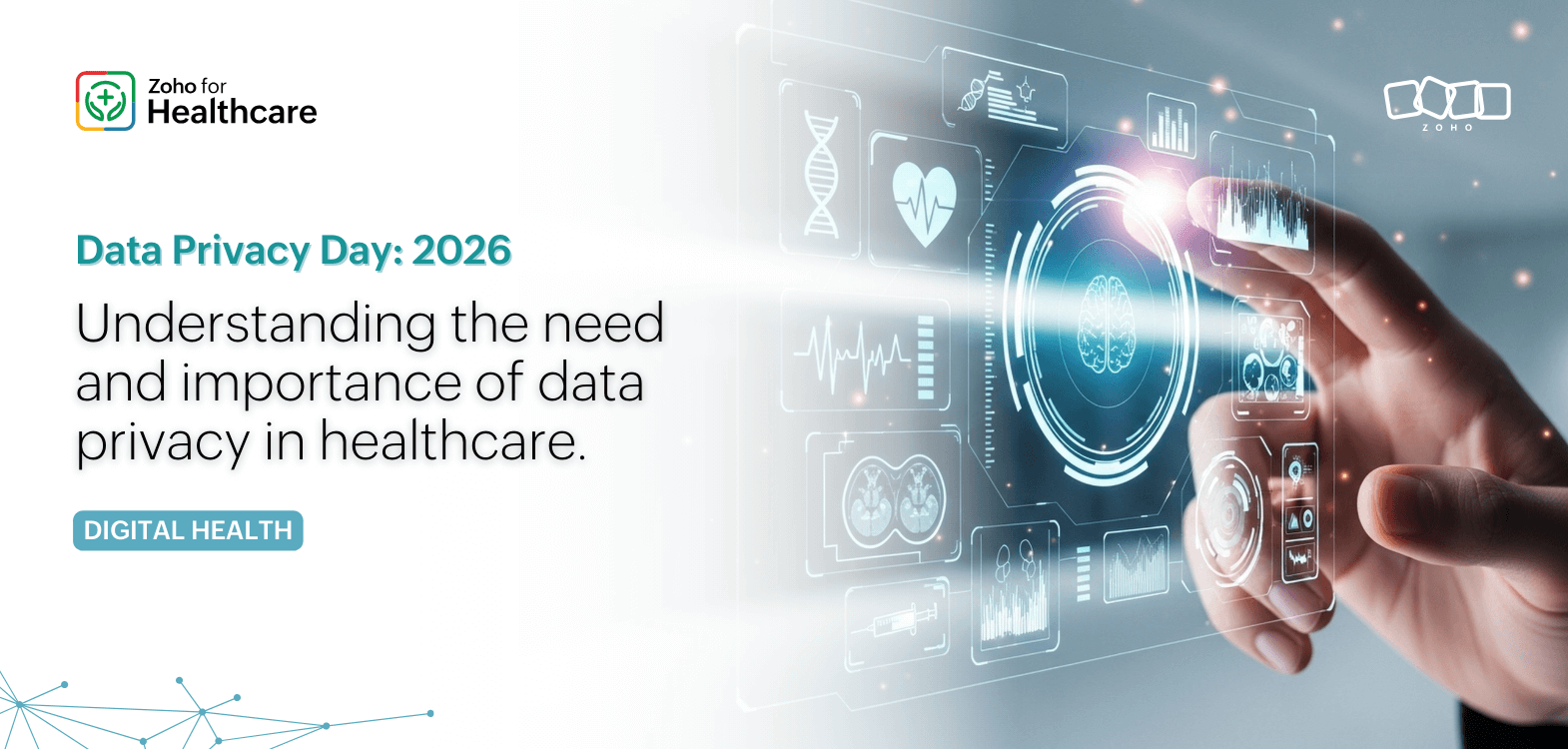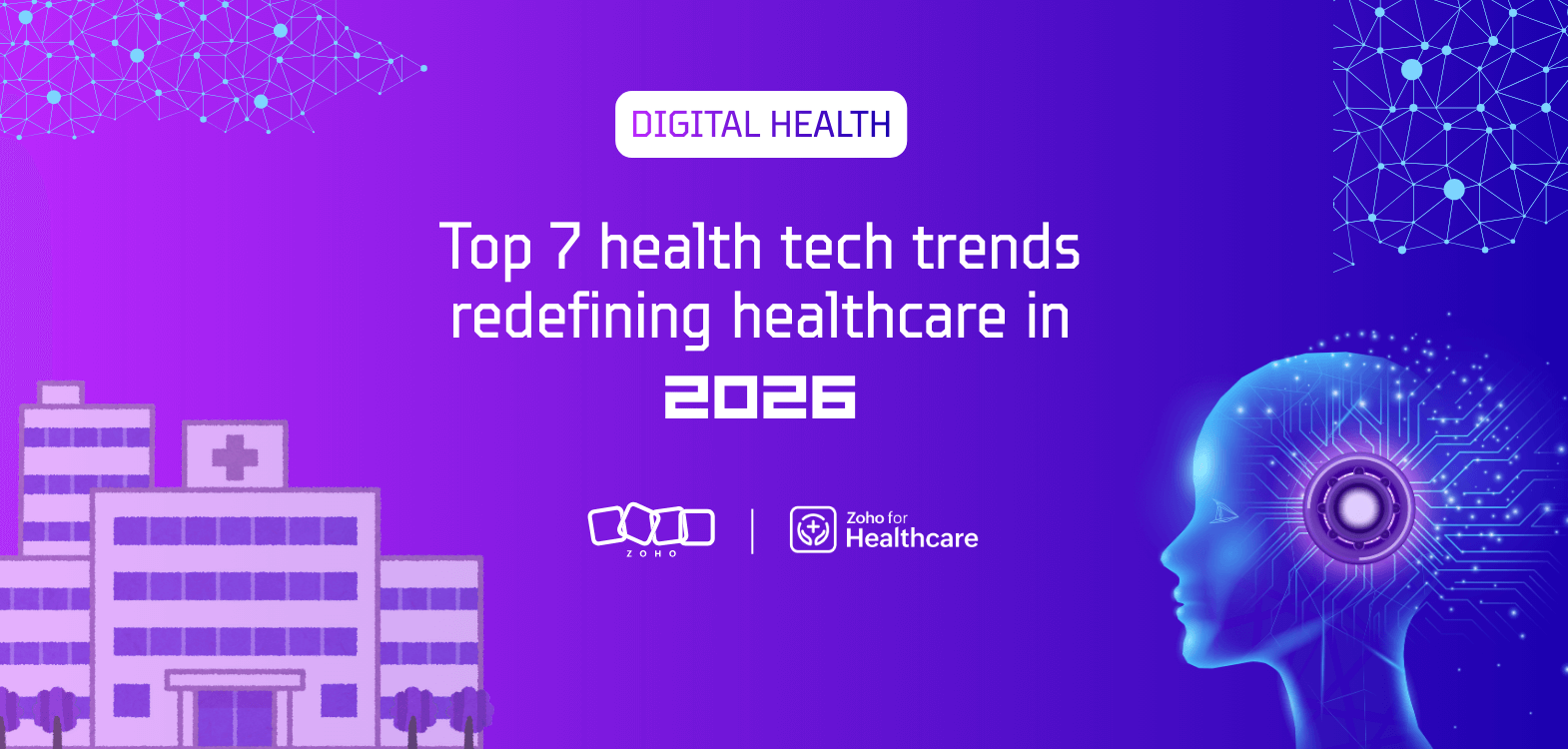- HOME
- Digital Health
- Practice management software: The key to paperless clinics and hospitals
Practice management software: The key to paperless clinics and hospitals
- Last Updated : May 2, 2025
- 452 Views
- 5 Min Read
Does your clinic or hospital's administrative desk look like this?

In an age where digital transformation is reshaping every industry, healthcare practices still grappling with paper-based systems face mounting operational roadblocks. From misplaced files to storage issues and disintegrated data, paper records present more challenges than benefits.
The solution? Go digital.
Implementing practice management software (PMS) is the key to unlocking an efficient, organized, and paperless office. In this blog post, we'll explore how a digitized workflow can simplify your everyday administrative load, boost productivity, and improve patient care. But first, let's look at the current scenario of a paper-based administration process in clinics and hospitals.
- Patient registration forms: Many clinics still use physical forms to record patient visits and collect and store essential information like contact details and chief complaints.
- Medical history forms: These are used to collect a patient’s medical history, allergies, previous diagnoses, and treatments, often carried from one provider to another.
- Referral forms: These documents are maintained for tracking purposes when a patient is referred to another specialist or healthcare institution.
- Consent forms: Management still uses forms for obtaining consent from their patients authorizing specific treatments or procedures.
- Emergency department: When a patient walks in for an emergency, many clinics and hospitals rely on forms to document assessments, diagnoses, and treatments.
- Laboratory and pharmacy: Paperwork is massive with laboratory and pharmacy management because there are multiple processes including sample collection, testing, reporting, prescription handling, and inventory control.
- Billing and insurance: Paper documents are used to process claims, generate invoices, and manage payments, which becomes tedious when patients visit multiple departments.
- Discharge summaries: These summaries provide an overview of a patient's stay, including diagnoses, treatments, and post-discharge instructions and follow-ups for review.
- Feedback and survey forms: Most institutions still use forms to collect patient feedback, making it tedious to record and assess the visitors' feedback manually.
- Compliance and regulations: Clinics and hospitals must adhere to various regulations and standards, and maintaining paper records for audits and regulations is both time-consuming and error-prone.
The challenges of paper-based administration
Once standard, paper-based administration has become inefficient and outdated, especially as patient expectations and clinical demands grow. Many clinics and hospitals in remote areas still prefer this approach due to the lack of knowledge and technical training of the software.
- Manual errors: Handwritten notes and forms are prone to human errors and mistakes in recording vital patient data and medical histories.
- Time-consuming: Manual entry of patient data, filing documents, and tracking appointments consume valuable staff hours.
- Storage issues: Maintaining paper files has many limitations, including larger storage areas, and can become unmanageable as patient volume increases.
- High operational costs: A traditional approach to maintaining records involves multiple processes and resources and has higher operational costs.
- Data security risks: These documents are vulnerable to loss, theft, or damage due to unforeseen accidents like fire, floods, or mishandling.
- Audit trails complexity: Paper files lack audit trails because the administrator cannot track any changes made to the files, making accountability a challenge.
- Compliance issues: Staying audit-ready and compliant with healthcare regulations is of utmost importance, and this becomes harder when records are manually maintained.
- Disrupted continuity: Physical records don’t support seamless transitions between providers or enable effective remote care.
The above-mentioned challenges not only slow down your practice, they create inefficient processes for your staff and a poor experience for your patients.
Going digital for a smoother workflow
PMS centralizes and digitizes day-to-day administrative tasks, offering a streamlined alternative to traditional paper-based methods. It takes care of the end-to-end patient journey with its wide range of functionalities covering everything from patient registration, appointment management, investigation and treatment plans, invoicing and billing to analytics and report generation.

- Patient record management: Records essential patient information, diagnosis and treatment plans, medication histories, and their insurance provider details.
- Appointment management: Handles bookings, sends reminders, manages patient queues, and reduces no-shows with automated workflows.
- Electronic health records (EHRs): Integrations with EHRs help clinics and hospitals store and access patient histories, treatment notes, and reports securely from anywhere.
- Prescription management: Generates and manages digital prescriptions, ensuring accurate medication and dosage instructions.
- Inventory and supply management: Helps track hospital inventory and supplies to prevent low stocking or overstocking essential supplies
- Invoicing and billing: Generates accurate invoices, manages insurance claims, and handles payments digitally.
- Reporting and analytics: Gains insights on overall clinic or hospital performance, such as appointments booked, revenue generated, referrals earned, and other metrics.
- Data security and privacy: Ensures the data privacy and security of patients by staying in compliance with healthcare standards and accreditations.
Digitizing these tasks with PMS not only ensures data accuracy, it eliminates redundancy, reduces manual workload, and enhances your administrative processes.
The benefits of digitizing workflows
Going paperless isn’t just about replacing paper files—it’s about transforming the way your practice operates.
- Saves time: Automating appointment scheduling, billing, and reporting processes frees up your staff's valuable hours to focus on patient care.
- Enhances workflows: Reduce and enhance administrative workflows by automating tasks and allocating resources efficiently.
- Reduces spending: Expenditures on paper, printing, storage, and manual administrative workflows will be much lower.
- Optimizes space: Paper files take up a lot of storage space, and replacing them with PMS will make space for additional consultation areas.
- Improves collaboration: Digital records make it easier for teams to collaborate and share information securely across multiple branches and provide remote care.
- Reduces impact: Limiting paper waste aligns your practice with sustainable business practices that benefit the environment.
- Enhances accessibility: Access patient case histories and files securely from any location and provide quality remote care.
- Improves security: Digitized documentation provides role-based access to patient data and tracks modifications with detailed audit logs.
- Manages disaster recovery: Secure backups against disasters or threats prevent data loss.
Addressing data security and compliance concerns
One of the biggest concerns most practitioners raise in adopting digital solutions is data security. Thankfully, most modern PMS solutions are built with robust security and compliance standards.
- Access controls: Provide role-based access to ensure only authorized personnel can view or edit sensitive data.
- Data encryption: Protect and ensure that sensitive patient information is protected from unauthorized access both in transit and at rest from unauthorized access.
- Audit trails: Track and monitor who accessed or modified records to maintain accountability.
- Cloud backups: Minimize the risk of data loss due to hardware failure or disasters.
- Regulatory compliance: Comply with regional healthcare laws, regulations, standards, and accreditations to ensure data safety and privacy.
The future of paperless healthcare practices
Going paperless is no longer optional—it’s a necessity for practices looking to scale, improve their care, and stay compliant. With the right PMS, clinics can future-proof their operations, adapt to evolving patient expectations, and build a more resilient business.
With initiatives like Ayushman Bharat Digital Mission (ABDM) in India, many practices have now started to adopt digital solutions to empower their healthcare administrative systems. This is essential to modernize and set your practice apart for better patient outcomes.
At Zoho, we offer a comprehensive practice management software that is compliant with industry standards and regulations to manage your clinics' and hospitals' end-to-end administrative needs. Sign up for free or get in touch with our team to find the best solution to enhance and streamline your practice.


